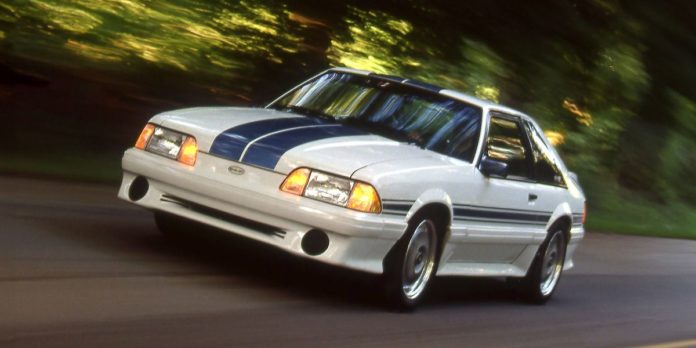From the December 1991 issue of Car and Driver.
These thing are bad: death, taxes, and staying up late to watch a “Love Boat” rerun only to miss the swimming-pool scene. These things are good: an unattended whiskey bottle, a sanitary American Standard with a stack of current periodicals, and a big, torquey, exhaust-belching American V-8 engine.
Care to guess what we think of the SAAC Mark 1 Mustang?
Before we continue, though, we need to make two things clear: first, SAAC stands for Shelby American Automobile Club, and second, Carroll Shelby had nothing to do with this car. Sure, he built the original big-bicep Mustang—the Vesuvian 1965 Shelby GT350—but his only involvement with this circa-1992 model was to offer his blessing. (Chrysler has a contract with his last name and understandably might be upset about others using it.) The Shelby American Automobile Club says it has been entitled to incorporate Shelby’s famous moniker as part of its club name. So when the SAAC membership began clamoring for a new Ford-powered Shelby, club founders Rick Kopec and Ken Eber were able to provide just such a car merely by beefing up Ford’s current Mustang GT and adding a few “SAAC”: badges. Voilà! The “Shelby” Mark 1 you see here.
Not that the SAAC Mark 1 isn’t a worthy successor to the GT350.
Like the original, this is a car crafted by Mustang zealots—in this case, key members of the SAAC. Particular credit goes to Dave Wagner, a former manager of Ford’s Power Product Operations group. In charge of supplying Ford hardware to aftermarket specialty makers (such as Saleen Autosport), Wagner knew just where to turn within the company to collect the parts needed for the Mark 1.
The Mark 1’s engine, for instance, is essentially the same powerplant developed for the stillborn 25th Anniversary Mustang. The basic 4.9-liter V-8—which, by the way, is not that far removed from the engine in the original GT350—is upgraded with “GT40” heads, a new intake system, and a 65mm throttle body. The engine exhales through a stainless-steel Borla exhaust with low-restriction mufflers. Power output climbs from 225 horsepower at 4200 rpm to 295 at 5250 rpm. Torque rises from 300 pound-feet at 3200 rpm to 348 at 3550 rpm.
Other pieces, including the Mark 1’s massive disc brakes, come from the bin of Ford’s Special Vehicle Operations branch. The five-speed shifter is a burly Hurst unit, and the suspension—with higher spring rates and Koni shocks—is made up of bits from the 1991 and ’92 production Mustangs. Handsome mag wheels shod with Goodyear 245/50ZR-l 17s complete the package.
Cosmetic changes are few. The roll-bar-equipped cockpit on every Mark 1 is black; the standard Mustang seats are covered in bruising black-and-blue leather. Like the original GT350, the Mark 1 is available only in white with bright-blue racing stripes.
The conversion work is done by the Livernois Company of Dearborn, Michigan. Livernois removes the stock GT’s engine, replaces it with a dyno-tested SAAC unit (the stock powerplant is then converted for a future Mark 1), and completes the rest of the adaptation in two to three days. Eventually, Kopec says, the company will be able to turn out about five cars per week.
The SAAC Car Company will build a maximum of 250 Mark 1s, and these will be sold only to SAAC members. (Kopec notes, however, that anyone wishing to buy a Mark 1 can become a SAAC member for a modest fee.) After Mark 1 production ceases, the company will offer a similar car—dubbed, yes, the Mark 2—to the public through twelve selected Ford dealers.
The SAAC Mark 1’s small production target seems sensible given its price: a stunning $40,995, including gas-guzzler and luxury taxes.
What does the Mark 1 offer that a standard GT doesn’t?
More quickness, certainly. A run to 60 mph takes just 5.3 seconds, and a quarter-mile blast is over in 14.0 seconds at 100 mph. The last V-8 Mustang we tested hit 60 mph in 6.2 seconds and ran the quarter in 14.8. Our test car’s top speed, however, was a disappointing 143 mph—only 2 mph faster than the stock V-8’s. One reason is that our test car was equipped with the optional 3.55:1 rear end—great for off-the-line response but too short for big-number cruising. Wagner claims the Mark 1’s standard 3.27 rear axle offers a better acceleration/top-speed compromise.
In other ways, the Mark 1 is less accomplished than its less expensive sibling (which is, gasp, $25,000 less expensive). The Mark 1’s 0.85-g skidpad showing is only fractionally better than the stock Mustang V-8’s. And its 185-foot stop from 70 mph is longer than the stock Mustang’s.
Still, the Mark 1 is fast and playfully showy, it shifts great, and it has a rev-happy V-8 that produces noises right out of the Bullitt chase scene. In other words, it’s a lot like the original GT350.
Which doesn’t make the SAAC Mark 1 Mustang a good value, of course. But it certainly makes it a good thing.
Specifications
Specifications
1992 SAAC Mark 1 Mustang
Vehicle Type: front-engine, rear-wheel-drive, 4-passenger, 2-door coupe
PRICE
Base/As Tested: $40,995/$43,030
ENGINE
SOHC 16-valve V-8, iron block and heads, port fuel injection
Displacement: 302 in3, 4942 cm3
Power: 295 hp @ 4200 rpm
TRANSMISSION
5-speed manual
DIMENSIONS
Wheelbase: 100.5 in
Length: 179.6 in
Curb Weight: 3342 lb
C/D TEST RESULTS
60 mph: 5.3 sec
100 mph: 13.6 sec
1/4-Mile: 14.0 sec @ 100 mph
130 mph: 38.2 sec
Rolling Start, 5–60 mph: 5.8 sec
Top Speed: 143 mph
Braking, 70–0 mph: 185 ft
Roadholding, 300-ft Skidpad: 0.85 g
C/D FUEL ECONOMY
Observed: 16 mpg
EPA FUEL ECONOMY
City: 15 mpg
C/D TESTING EXPLAINED

